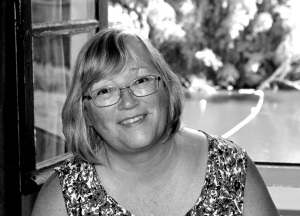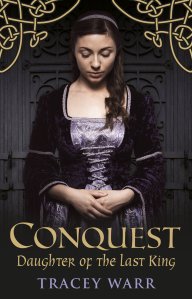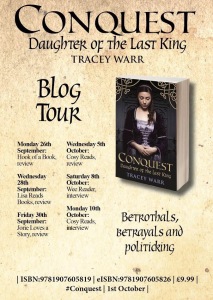This weekend I have an interview with historical fiction author Tracey Warr for you. The lovely people at Impress Books were kind enough to ask me if I wanted to be part of the blog tour for Warr’s new book, and I of course said yes! Conquest: Daughter of the Last King, which follows the daughter of the last independent Welsh king, is out now!
Tracey Warr. Photo by Tiffany Black.
1. Introduce yourself! Who are you? What do you write / what genre? What are you currently working on? Do you have any published works?
I write historical fiction set in the middle ages, published by Impress Books. My third novel is just out, Conquest: Daughter of the Last King. I’m working on the sequel. I’ve also published writing on contemporary art and a future fiction novella set on a watery exoplanet, Meanda, which I self-published as an ebook and on Twitter.

2. When did you first start writing and what motivated you to start?
I wrote a novel and a play as a child and have always been a voracious reader. Working as an art curator, critic and then academic, and being a mother, intervened in my early plans to ‘be a writer’. I didn’t start writing fiction seriously until my daughter left home around eight years ago.
3. What inspires you to write? Can you tell us about the inspiration for any specific pieces of writing you have completed / are working on?
I started writing during a frigid winter in an ancient house in the Tarn valley in southern France. The house itself, the isolation (with just my cat), the beautiful landscape full of rivers, castles and medieval villages such as Najac or Cordes sur Ciel, the history of the area, were my inspirations. I wrote stories for my daughter and nephew when they were children. My nephew asked me to write about a castle in France. During my research I came across the extraordinary countess, Almodis de La Marche. I absolutely had to write her story. She is the subject of my first novel, Almodis the Peaceweaver, and I’m now working on a biography about her and her sisters, Raingarde and Lucia.
4. How important is the planning stage for you? Do you like to plan everything before you start or do you simply start writing with a vague idea in mind?
I do a lot of research and planning since my fiction is mostly based on real historical people and events. I find out as much as I can, plot out what I can in a timeline, make a ‘map’ or summary of chapters, rough out character details. Things often change in the writing process – new chapters and scenes occur, characters become someone other than my original plan, but nevertheless the planning helps to get me going and gives me a structure to write forward into.
5. What is your writing process like?
I would like to say systematic, steady, regular, but it isn’t! I have to work around other activities that pay the rent. Sometimes I have days and days of solid writing when I go into what I think of as writing purdah. I don’t socialise, I try not to look at email or do other work. Other times I only get to work on a manuscript a few days a week. I definitely write best first thing in the morning and wake up with enormous momentum that then slows down and fizzles out altogether by tea time.
6. What are your writing essentials / what do you use when you write?
I like to write in a good notebook with an ink pen. Then I transfer writing to my laptop and edit over and over, often printing out and working on a hard copy. Ideally I need a clear desk, some reference books, wifi and a great view. My desk at home looks out over a green river where a heron is often fishing and a kingfisher darts around.
7. What is your favourite thing to write? E.g. Dialogue, action scenes, saucy scenes…
I enjoy writing dialogue, action and description. They are all essential. I try to write in a very visual and sensory way – imagining the scene, the place, weather, seeing and feeling my characters there, trying to take the reader there.
8. What do you think is the most difficult part of writing?
Time. Never having enough clear time to dream it up in a leisurely way and then to edit a thousand times over until its polished to its full shine. It’s probably an impossible aim. So I just tell myself: do your best before the deadline.
If you are struggling with your writing try shifting it from one place to another. By that, I mean if you usually work on a computer – compile a summary of what you’ve done, what you’ve got to do, what the problems are, in a notebook instead, or on a very big piece of paper stuck to the wall. Keep a writing log of how many words you have written each day and how many days you have left before your deadline. You may feel that you are making no progress but the log will show you that progress is occurring. Take your line for a walk. Look at a hanging thread in your story, a character problem, or some words you like the sound of, and take them out for a walk. Something will shake loose and get your writing going. Take a notebook with you so you don’t forget your inspirations.
9. It is always interesting to know what other writers listen to when writing. Do you listen to music whilst you write? If so, let us know some of the songs which have inspired you the most!
Definitely not. I need silence, or at least just environmental sound. I listen to the language shaping up in my head.
10. Do you ever struggle with writer’s block? What do you do to overcome it?
No. More like writer’s obstacles – other work I have to do to earn a living that gets in the way. If I get stuck, going for a swim in the river, a walk, soaking in a bath or sleeping all help generate more words.
11. How do you go about researching for a new book? Do you have any tips for others who are researching for a book?
This, I am systematic about. I research a fiction book in the same way as I would work on a non-fiction book. There are primary sources such as medieval chronicles featuring my characters and key historians who have written about my characters, their world, other people around them. I compile a working bibliography of books and articles and read my way through, making copious notes, annotating my timeline. I visit places such as castles and go to museums to look at objects and images that may have been part of my characters’ daily lives and surroundings. I try to find old maps and get a sense of how my characters might be moving around on horseback and on rivers.
12. Where do you find your inspiration for character names and place names? Do you ever name characters after people you know?
Place names are usually real in my historical fiction, as are many of the character names. For my invented characters I look at lists of authentic female and male names for the era and area and choose what appeals. In my recent future fiction novella I invented an ocean exoplanet called Meanda (thinking of meandering rivers) and named the aquatic alien in the story, Jorunn, after a female Viking poet, and the human male character I called Frank Parkinson, after Frank Hurley who documented Shackleton’s arctic voyage, and Sydney Parkinson, who was an artist on James Cook’s voyage to South America.
13. What are your future plans when it comes to writing or even publishing?
Conquest is a trilogy about Princess Nest, the daughter of the last independent Welsh king during the time of the Norman invasions of Wales. I have two more novels to write in that series. Then I’ve got the non-fiction biography of three medieval sisters mentioned above. I’m also planning to develop my future fiction story where water is a kind of protagonist.
14. As we all love books I wondered, what are your five favourite books?
- Jane Austen’sPersuasion
- George Eliot’s Middlemarch
- Donna Leon’s Brunetti books (any one)
- Keith Douglas’s Collected Poems
- Shakespeare’s Sonnets … only five, I’m just warming up!
15. Can you tell us a little more about your journey towards getting published and your experience? And do you have any advice for others hoping to publish in the future?
Once I’d found Almodis’s story and knew I had a novel to write about her, I joined an MA in Creative Writing with University of Wales in Carmarthen. It was important to talk with other writers and tutors, to give myself permission to be a fiction writer. I entered three chapters of Almodis for the Impress Prize. It was shortlisted which was a great encouragement. Impress Books asked me to submit more of the manuscript and offered me a contract. I’ve been very pleased to work with them ever since. I like the idea of finishing a manuscript and not showing it to anyone until you’ve edited it many times over, however in reality I think entering competitions, finding ways of giving yourself deadlines is essential to drag the story out of you.
Writing a novel is a long haul and any support you can get in the process is gold-dust. I belong to a writers group. I’m a member of the Society of Authors, the Royal Literature Society and the Historical Novel Society. I self-published my future fiction novella, Meanda, as an ebook as an experiment, and I think for some writers that can be a good way forward. I teach on a residential creative writing course in France for www.achapteraway.com and each course has a publisher and or literary agent together with published writers to talk to about getting published.
16. Finally, where can we find you on social media?
- traceywarrwriting.com
- Facebook – traceywarrwriting
- Twitter – TraceyWarr1
- Goodreads – Tracey Warr
- Impress Books
I hope you enjoyed this weeks writing interview, it’s always so interesting to hear from traditionally published authors. It was also great to hear from a historical fiction author. I can’t wait to read Conquest: Daughter of the Last King, when I do I will be sure to upload a review here. This interview was part of a blog tour, so there are plenty other blog posts to read!
You can find Conquest: Daughter of the Last King here: Wordery / Book Depository / UK Amazon!
Don’t forget you can follow me on: Instagram, Twitter, Tumblr, Goodreads & Pinterest!


Great interview Christine! Your questions are great and I loved reading Tracey’s answers! 😊
Thank you Mia! I loved reading them as well, so motivational!
Nice post ma’am. Very interesting to hear about how she writes and her journey there.
Thanks for reading! Tracey has an interesting process!